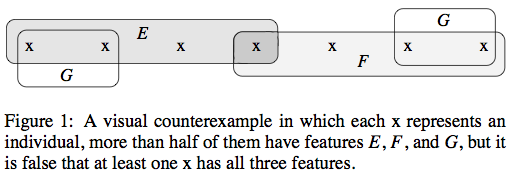Posts Tagged: logic
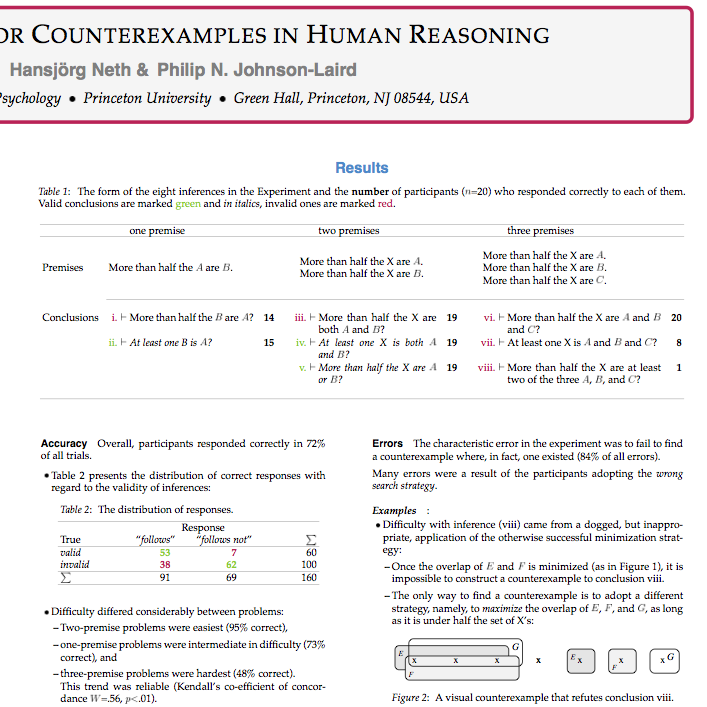
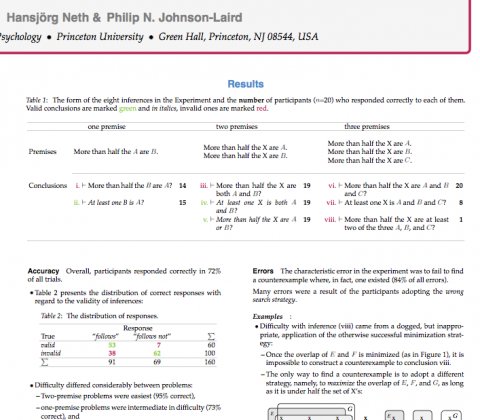
Paper: Searching for counterexamples
| If it was so, it might be; and if it were so, it would be; but as it isn’t, it ain’t. That’s logic. |
| Tweedledee (Lewis Carroll, Through the Looking Glass and what Alice found there, 1872) |
Hansjörg Neth, Philip N. Johnson-Laird
The search for counterexamples in human reasoning
Research question: A major point of contention about human reasoning is whether or not individuals search for counterexamples to conclusions. According to theorists who argue that the mind is equipped with tacit rules of inference, the decision that an argument is invalid depends on a failure to find a derivation leading from the premises to the conclusion (see e.g., Rips, 1994). However, with this procedure, one can never be cer- tain that the space of possible derivations has been searched exhaustively. Alternatively, reasoners may base their inferences on mental models (Johnson-Laird and Byrne, 1991). This theoretical account rests on the semantic principle of validity: a conclusion is valid if and only if it allows for no counterexamples, i.e., possibilities in which the premises are true but the conclusion is false. Hence, by constructing a counterexample, reasoners are able to know that an inference is invalid.
Method: To search for a search for counterexamples, we carried out an experiment in which the participants had to evaluate eight inferences based on non-standard quantifiers. Quite common in everyday life, such inferences call for a higher-order predicate calculus, which is incomplete.
Results: A striking phenomenon was the participants’ spontaneous use of a variety of strategies. In 80% of all trials, they constructed a single specific instance of the premises. Typically, the participants constructed a diagram in which they tried to minimize the overlap between the given sets. Indeed, every single participant came up with at least one counterexample. Our study has shown (…) that logically naive individuals do spontaneously search for counterexamples for at least one sort of deduction.
Keywords: Logic, thinking and reasoning, syllogisms with non-standard quantifiers, mental model theory, counterexamples.
Reference: Neth, H., & Johnson-Laird, P. N. (1999). The search for counterexamples in human reasoning. In M. Hahn, & S. C. Stoness (Eds.), Proceedings of the 21st Annual Meeting of the Cognitive Science Society (p. 806). Mahwah, NJ: Lawrence Erlbaum.
Related: Suppression effects | Diploma thesis
Resources: Download PDF | Google Scholar
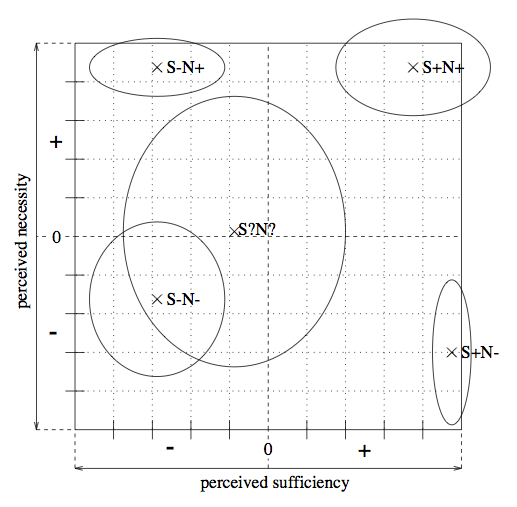
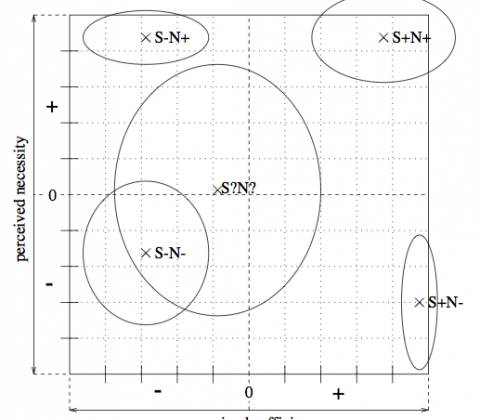
Paper: Suppression effects
| A conditional (…) is not a creature of constant hue, but chameleon-like, takes on the colour of its surroundings: its meaning is determined to some extent by the very propositions it connects. |
| P.C. Wason and P.N. Johnson-Laird (1972), Psychology of reasoning: Structure and content, p. 92 |
| Conditionals are acceptable in virtue of a number of different patterns of dependence (…) If we have no pattern of dependence in mind, a primary object of our investigation should then be to get one in mind. |
| D.H. Sanford (1989): If P, then Q: Conditionals and the foundations of reasoning, p. 196ff |
Hansjörg Neth, Sieghard Beller
How knowledge interferes with reasoning: Suppression effects by content and context
Abstract: The suppression of logically valid inferences by the content or context of premises can be seen as an instance of knowledge having a detrimental influence on reasoning. Although Henle (1962) has claimed that invalid deductions are due to additional premises drawn from background knowledge, current research on content effects ignores the methodological implications of this claim. Elaborating on the suppression effect in conditional reasoning (Byrne, 1989), we present a knowledge-based approach that makes relevant features of background knowledge an integral part of the analysis. After identifying the sufficiency and necessity of conditions as the type of knowledge mediating the effect, we construct and validate task materials independently from any assessment of reasoning (Experiment 1). We then replicate and extend suppression effects in syllogism tasks (Experiment 2) and show that participants are able to couch their background knowledge in formally correct wordings (Experiment 3).
Keywords: Logic, thinking and reasoning, conditional syllogisms, effects of knowledge, content, context.
Reference: Neth, H., & Beller, S. (1999). How knowledge interferes with reasoning: Suppression effects by content and context. In M. Hahn, & S. C. Stoness (Eds.), Proceedings of the 21st Annual Meeting of the Cognitive Science Society (pp. 468–473). Mahwah, NJ: Lawrence Erlbaum.
Related: Searching for counterexamples | Diploma thesis
Resources: Download PDF | Google Scholar
